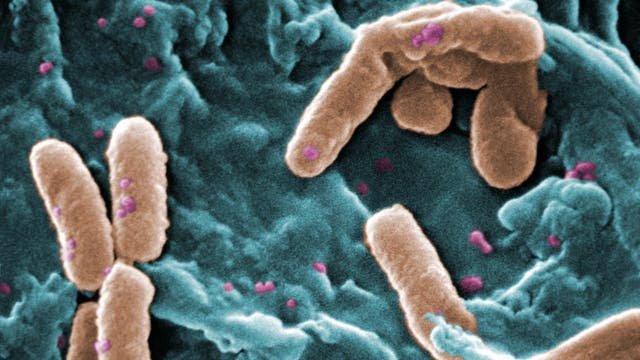Übergewicht und Fettsucht sind heute schon Volkskrankheiten. Was treibt Menschen dazu, wider besseres Wissens mehr in sich hineinzustopfen, als ihnen gut tut? Mediziner suchen die Antwort im Gehirn.
Der Tag war lang. Und Sie sitzen immer noch im Büro – doch die Konzentration ist dahin. Der Blutzucker geht gegen Null, Ihr Gehirn beschäftigt nur noch ein einziger Gedanke: Wo kriege ich jetzt was zu essen her? Mit zittrigen Händen kratzen Sie Ihr letztes Kleingeld zusammen, springen auf und rennen über die Straße zur Pommes-Bude. Während Sie gierig über die fettige Currywurst herfallen, regt sich plötzlich das schlechte Gewissen: Was tu ich hier eigentlich? Selbst überzeugte Fast-Food-Verächter werden schwach, wenn sie mit knurrendem Magen an einem entsprechenden Etablissement vorbeigehen ...
Erratum:
Am Schluss des Artikels wird Naltrexon als "bewährtes Antidepressivum" bezeichnet. Naltrexon ist aber kein Antidepressivum, sondern ein Opiat-Entwöhnungsmittel.
Literaturtipps:
Beaver, J. D. et al.: Individual Differences in Reward Drive Predict Neural Responses to Images of Food. In: Journal of Neuroscience 26(19), 2006, S. 5160-5166.
Berthoud, H.-J.: Brain, appetite and obesity. In Physiology & Behavior 85(1), 2005, S. 1-2.
Hamilton, M. E., Freeman, A. S.: Diet and Chronic Haloperidol Effects on Rat Midbrain Dopamine Neurons. In: Synapse 53(1), 2004, S. 1-5.
Kiefer, F. et al.: Leptin: a Modulator of Alcohol Craving? In: Biological Psychiatry 49(9), 2001, S. 782-787.
Kiefer, F. et al.: Increasing Leptin Precedes Craving and Relapse During Pharmacological Abstinence Maintenance Treatment of Alcoholism. In: Journal of Psychiatric Research 39(5), 2005, S. 545-551.
Kilts, C. D. et al.: Neural Activity Related to Drug Craving in Cocaine Addiction. In: Archives of General Psychiatry 58(4), 2001, S. 334-341.
Kilts, C. D.: Imaging the Roles of the Amygdala in Drug Addiction. In: Psychopharmacology Bulletin 35(1), 2001, S. 84-94.
LaBar, K. S. et al.: Hunger Selectively Modulates Corticolimbic Activation to Food Stimuli in Humans. In: Behavioral Neuroscience 115(2), 2001, S. 493-500.
Müller, M. J. et al.: Prävention und Therapie von Übergewicht im Kindes- und Jugendalter. In: Deutsches Ärzteblatt 103(6), 2006, S. A 334-340.
Rodríguez, S. et al.: Subjective and Physiological Reactivity to Chocolate Images in High and Low Chocolate Cravers. In: Biological Psychology 70(1), 2005, S. 9-18.
Shalev, U. et al.: Leptin Attenuates Acute Food Deprivation-Induced Relapse to Heroin Seeking. In: Journal of Neuroscience 21(4), 2001, RC129.
Small, D. M. et al.: Changes in Brain Activity Related to Eating Chocolate: from Pleasure to Aversion. In Brain 124(9), 2001, S. 1720-1733.
Volkow, N. D., Wise, R. A: How Can Drug Addiction Help Us Understand Obesity? In: Nature Neuroscience 8(5), 2005, S. 555-560.
Van Gaal, L. F. et al.: Effects of the Cannabinoid-1 Receptor Blocker Rimonabant on Weight Reduction and Cardiovascular Risk Factors in Overweight Patients: 1-year Experience from the RIO-Europe Study. In: The Lancet 365(9468), 2005, S, 1389-1397.
Wang, G.-J. et al.: Brain Dopamine and Obesity. In: The Lancet 357(9253), 2001, 354-357.
Am Schluss des Artikels wird Naltrexon als "bewährtes Antidepressivum" bezeichnet. Naltrexon ist aber kein Antidepressivum, sondern ein Opiat-Entwöhnungsmittel.
Literaturtipps:
Beaver, J. D. et al.: Individual Differences in Reward Drive Predict Neural Responses to Images of Food. In: Journal of Neuroscience 26(19), 2006, S. 5160-5166.
Berthoud, H.-J.: Brain, appetite and obesity. In Physiology & Behavior 85(1), 2005, S. 1-2.
Hamilton, M. E., Freeman, A. S.: Diet and Chronic Haloperidol Effects on Rat Midbrain Dopamine Neurons. In: Synapse 53(1), 2004, S. 1-5.
Kiefer, F. et al.: Leptin: a Modulator of Alcohol Craving? In: Biological Psychiatry 49(9), 2001, S. 782-787.
Kiefer, F. et al.: Increasing Leptin Precedes Craving and Relapse During Pharmacological Abstinence Maintenance Treatment of Alcoholism. In: Journal of Psychiatric Research 39(5), 2005, S. 545-551.
Kilts, C. D. et al.: Neural Activity Related to Drug Craving in Cocaine Addiction. In: Archives of General Psychiatry 58(4), 2001, S. 334-341.
Kilts, C. D.: Imaging the Roles of the Amygdala in Drug Addiction. In: Psychopharmacology Bulletin 35(1), 2001, S. 84-94.
LaBar, K. S. et al.: Hunger Selectively Modulates Corticolimbic Activation to Food Stimuli in Humans. In: Behavioral Neuroscience 115(2), 2001, S. 493-500.
Müller, M. J. et al.: Prävention und Therapie von Übergewicht im Kindes- und Jugendalter. In: Deutsches Ärzteblatt 103(6), 2006, S. A 334-340.
Rodríguez, S. et al.: Subjective and Physiological Reactivity to Chocolate Images in High and Low Chocolate Cravers. In: Biological Psychology 70(1), 2005, S. 9-18.
Shalev, U. et al.: Leptin Attenuates Acute Food Deprivation-Induced Relapse to Heroin Seeking. In: Journal of Neuroscience 21(4), 2001, RC129.
Small, D. M. et al.: Changes in Brain Activity Related to Eating Chocolate: from Pleasure to Aversion. In Brain 124(9), 2001, S. 1720-1733.
Volkow, N. D., Wise, R. A: How Can Drug Addiction Help Us Understand Obesity? In: Nature Neuroscience 8(5), 2005, S. 555-560.
Van Gaal, L. F. et al.: Effects of the Cannabinoid-1 Receptor Blocker Rimonabant on Weight Reduction and Cardiovascular Risk Factors in Overweight Patients: 1-year Experience from the RIO-Europe Study. In: The Lancet 365(9468), 2005, S, 1389-1397.
Wang, G.-J. et al.: Brain Dopamine and Obesity. In: The Lancet 357(9253), 2001, 354-357.







Schreiben Sie uns!
Beitrag schreiben